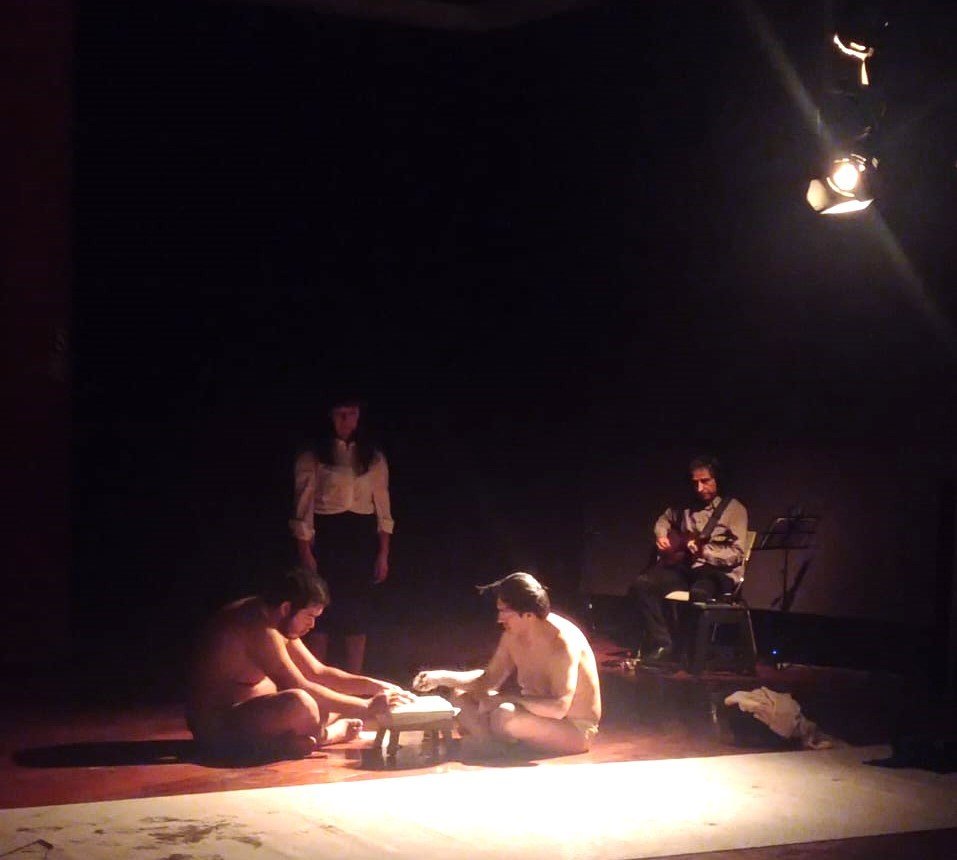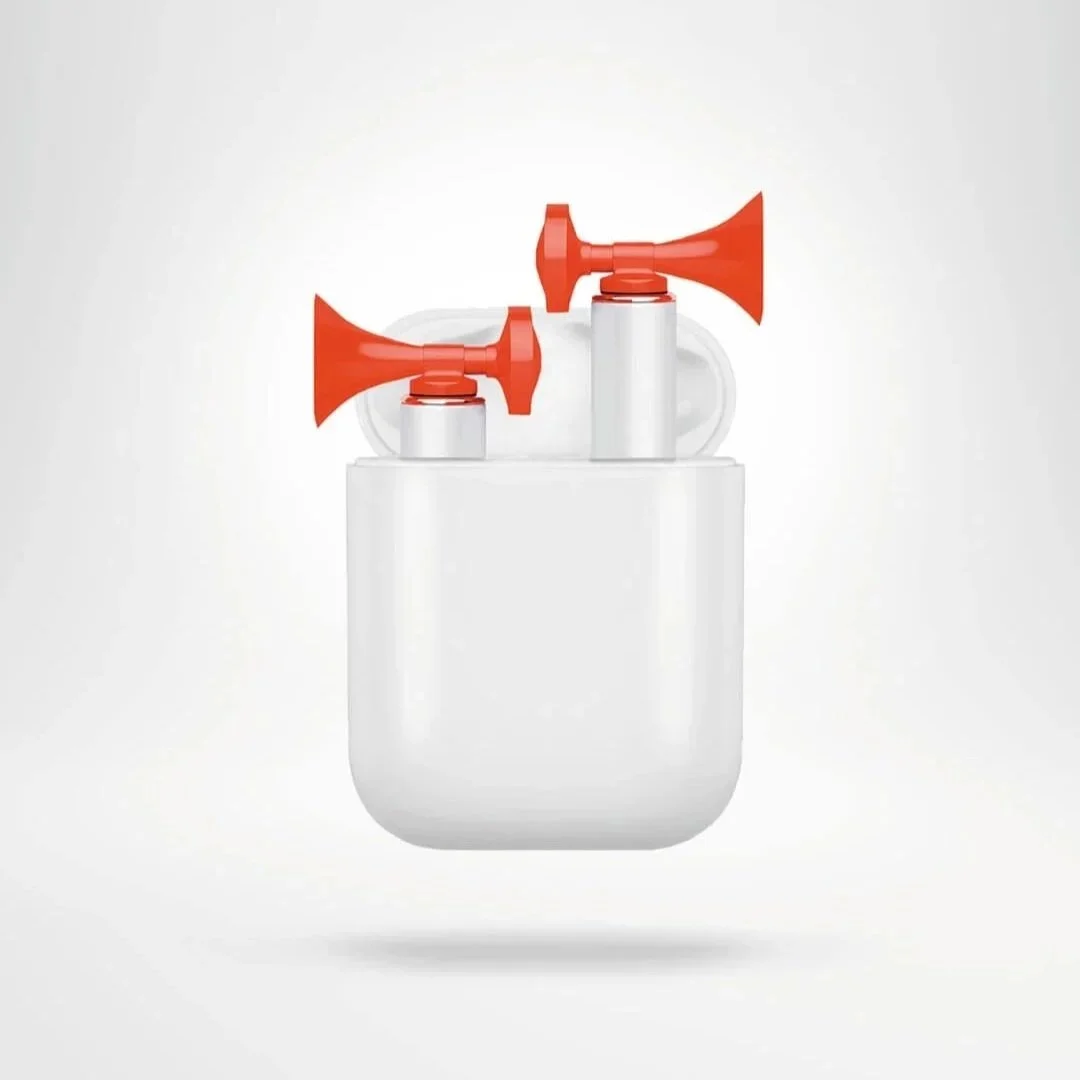By Julio Flores-Alberca
(Desplácese hacia abajo para ver una traducción al español de este artículo.)
I am a Peruvian musician who has suffered from pain hyperacusis and tinnitus since 1992. In 2006 my condition became severe and I could no longer play music publicly. After some years I could overcome the severity and in 2018, with some fear, I started to make some brief musical performances where there was not much exposure to loud noises, always wearing dual hearing protection (earplugs and earmuffs).
In 2023, I accepted an invitation to participate in a small dance-theater play, performing musical pieces of my own, which would have a soft and calm sound. I was able to do it without much difficulty.
Using his fretless guitar, Julio Flores-Alberca performs music he composed for the play that includes elements from Chinese, Japanese, Greek, and Arabic music.
(Desplácese hacia abajo para ver una traducción completa al español.)
In February of this year, I received a new invitation to participate in another multidisciplinary work, but of a larger scope, which would also involve composing and performing live music, but this time at a higher volume level and for a longer period of time. It was the work “Los Tres Cantos del Gallo” (The Three Crowings of the Rooster), created and directed by Ítalo Panfichi and Mónica Vergara, an experimental piece that would address the contradictory nature of the human condition.
The directors of the play already knew that I had pain hyperacusis and tinnitus, but they still wanted me to participate in the play, as they also knew my work with eastern music and experimental sounds. They would give me all the facilities to be able to do the work, and would allow me to wear all the necessary protection (earplugs, earmuffs, etc.) during rehearsals and performances.
Given these favorable conditions I enthusiastically accepted the job, and then we began preliminary rehearsals. The music would be entirely composed for the play and would include elements from Chinese, Japanese, Greek, and Arabic music, which would be played using my fretless guitar and some electronic devices in order to generate the necessary microtonal atmosphere and subtle feeling.
Shortly after, the play was scheduled in an important theater of the city of Lima, with six performances to be given during August. Keeping in mind those established dates, rehearsals began in March and would continue throughout the following months.
However, in April, due to an unexpected exposure to extremely loud noise, I suffered a relapse in my hyperacusis and had to stop all my activities. This made me fear that I would not be able to continue with the job, and even that this could put the entire team at risk for the scheduled performances.
Julio wears protective earmuffs while performing the music for the play.
The directors understood the situation and, in order to help me recover, allowed me to be absent from rehearsals and return the following month.
I resumed rehearsals in a spaced manner in May with a lot of apprehension and fear of getting worse, but fortunately and thanks to the great empathy and collaboration of the entire team I was able to continue without difficulty. All the time they tried to ensure that there was no excessive noise that could affect me, and/or notify me in advance when this was going to occur so that I could protect my ears opportunely.
Although I felt very anxious at several moments during the process, as the months went by I overcame the relapse and finally managed to complete the six performances successfully. The audience very much liked the play as a whole and the music received very good feedback.
This has been a big challenge for me, due to my pain hyperacusis and tinnitus, but now I feel very happy to have been able to achieve it. New performances will come, and I am very confident that I will be able to continue fulfilling the job... with a little help from my friends!
Julio Flores-Alberca lives in Peru. Since 2023 he has been translating select pages of HHF’s blog and magazine into Spanish. See information about his band Quarter Note, archival videos by the band, and his blog about hyperacusis in both Spanish and English. He contacted Hearing Health Foundation after reading the story, “What If We Heard Tinnitus as an Orchestra?”
¡Con una Pequeña Ayuda de Mis Amigos!
Por Julio Flores-Alberca
Soy un músico peruano que padece de hiperacusia con dolor y de tinnitus desde 1992. El 2006 mi condición se volvió severa y no pude volver a tocar música públicamente. Tras superar la severidad después de algunos años, a partir del año 2018 con cierto temor, comencé a realizar algunas breves presentaciones musicales donde no hubiera mucha exposición a ruidos altos, y utilizando siempre doble protección auditiva (tapones y orejeras).
El 2023 acepté la invitación para participar en una pequeña obra de danza-teatro, interpretando piezas musicales de mi autoría, las cuales tendrían un sonido suave y calmado. Lo pude hacer sin mayor dificultad.
En febrero de este año recibí una nueva invitación para participar en otra obra multidisciplinaria, pero de mayor envergadura, que implicaría igualmente, componer y ejecutar música en vivo, pero esta vez a un nivel de volumen más intenso y por un período de tiempo más largo. Se trataba de la obra “Los Tres Cantos del Gallo”, (The Three Crowings of the Rooster) creada y dirigida por Ítalo Panfichi y Mónica Vergara, una pieza experimental que abordaría lo contradictorio de la condición humana.
Los directores de la obra ya sabían que yo tenía hiperacusia con dolor y tinnitus, pero igual querían tenerme presente en la obra, pues conocían también mi trabajo con la música oriental y las sonoridades experimentales. Ellos me darían todas las facilidades para poder realizar el trabajo, y me permitirían llevar puesta toda la protección necesaria (tapones, orejeras, etc.) durante los ensayos y las presentaciones.
En vista de estas condiciones favorables acepté con mucho entusiasmo el trabajo, y entonces comenzamos con los ensayos preliminares. La música sería íntegramente compuesta para la obra e incluiría elementos provenientes de la música china, japonesa, griega y árabe, la cual sería interpretada utilizando mi guitarra sin trastes y algunos dispositivos electrónicos, para así generar la atmósfera microtonal y la carga emotiva necesaria.
Al poco tiempo la obra consiguió ser programada en un teatro importante de la ciudad de Lima, con 6 funciones a ofrecerse durante el mes de agosto.
Momentos oníricos al inicio de la obra “Los Tres Cantos del Gallo”.
Con miras a ese evento que ya tenía fechas establecidas, se iniciaron los ensayos en marzo y continuarían durante todos los meses siguientes. Sin embargo, en el mes de abril, a raíz de una exposición a ruido intenso inesperada, sufrí una recaída con la hiperacusia, y tuve que detener todas mis actividades. Esto me hizo temer no poder continuar con la obra, e incluso poner en riesgo a todo el equipo para las presentaciones programadas.
Los directores comprendieron la situación y con el fin de que me pudiera recuperar, me permitieron ausentarme a los ensayos durante un tiempo y reincorporarme el siguiente mes.
Retomé los ensayos de manera espaciada en el mes de mayo con mucha aprehensión y temor de ponerme mal, pero felizmente y gracias a la gran empatía y colaboración de parte de todo el equipo pude realizarlos sin dificultad. Ellos trataron en todo momento de que no hubiese ruidos excesivos que me pudieran afectar, y/o de avisarme con anticipación cuando estos iban a producirse para así poder proteger mis oídos de manera oportuna.
Si bien me sentí muy ansioso en varios momentos, conforme pasaron los meses la recaída la fui superando y logré cumplir con éxito las 6 presentaciones. Al público le gustó mucho la obra en su conjunto y la música recibió muy buenos comentarios.
Esto ha sido un gran reto para mí, debido a mi hiperacusia con dolor y al tinnitus, pero ahora me siento muy contento por haber podido lograrlo. Se vienen nuevas funciones, y estoy muy confiado en que podré seguir cumpliendo con el trabajo... !con una pequeña ayuda de mis amigos!
Julio Flores-Alberca vive en Perú. Vea información sobre su banda Quarter Note , videos de archivo de la banda y su blog sobre hiperacusia tanto en español como en inglés. Él tomó contacto con la Hearing Health Foundation después de leer la historia “What If We Heard Tinnitus as an Orchestra?” (“¿Qué pasaría si oyéramos el tinnitus como una orquesta?”).
Traducción al español realizada por Julio Flores-Alberca, setiembre 2024. Sepa más aquí.









It bears repeating: What improves access for a group with a specific disability invariably also helps the greater population.